I met a traveller from an antique land,Who said—”Two vast and trunkless legs of stoneStand in the desert…Near them, on the sand,Half sunk a shattered visage lies, whose frown,And wrinkled lip, and sneer of cold command,Tell that its sculptor well those passions readWhich yet survive, stamped on these lifeless things,The hand that mocked them, and the heart that fed;And on the pedestal, these words appear:My name is Ozymandias, King of Kings;Look on my Works, ye Mighty, and despair!Nothing beside remains. Round the decayOf that colossal Wreck, boundless and bareThe lone and level sands stretch far away.”
I did, however, go see the Zack Snyder film when it came out some 10 years ago. There was a group of us who went to see it in the theater, and frankly I was disappointed. It felt long, and as it wore on I found myself longing for the time after the movie when we’d go to the bar together and talk about it.
It started out well—what with that opening scene with the Comedian and then the credits sequence—but as it went on I felt it dragged. I got bored.
But something about this film stuck with me. It stuck in my imagination. I couldn’t stop thinking about it. And it wasn’t the plot, though at the end of the day I did find that to be interesting and understood why so many people had told me over the years to read the graphic novel.
It was something about the style, I guess. It was something about this ’80s aesthetic and those glasses Dan wears, or those bangs on Laurie. It was something about how Snyder did the thing with stop-motion and all of that.
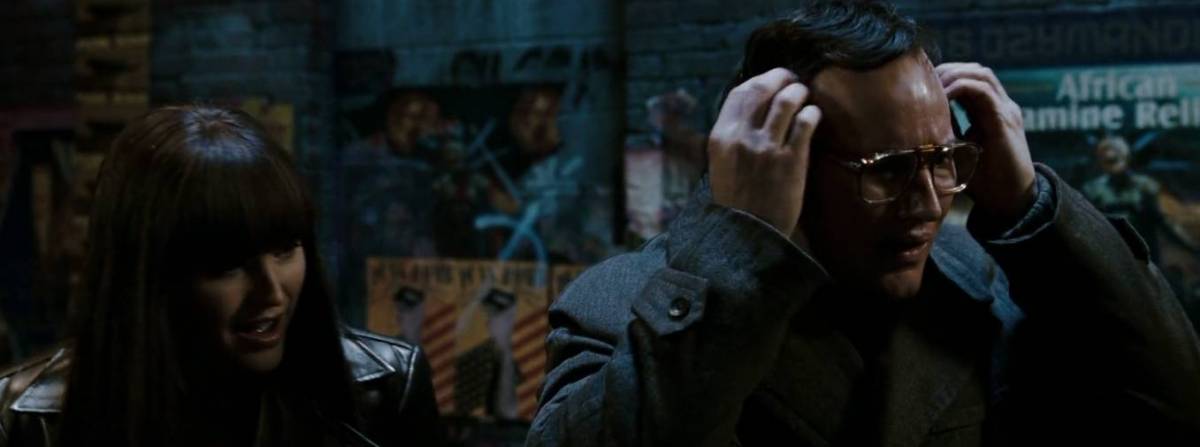
I kept thinking about it.
And, so, I watched it again, this time with what I found myself thinking of as “Tarkovsky eyes”—that is, I was approaching it as an art film rather than a Hollywood one—and I found that I loved it.
On a second viewing, rather than getting bored with the slow movement of the plot, I found myself luxuriating in the film’s style.
I was a kid in the ’80s, but the vibe of it informed me. Big glasses, just say no to drugs, and Ronald Reagan. He may be mocked in Watchmen, but here’s the thing: he brought back that ethos of Nixon. And, now, Trump has as well. I think Trump idolizes Nixon, in fact.
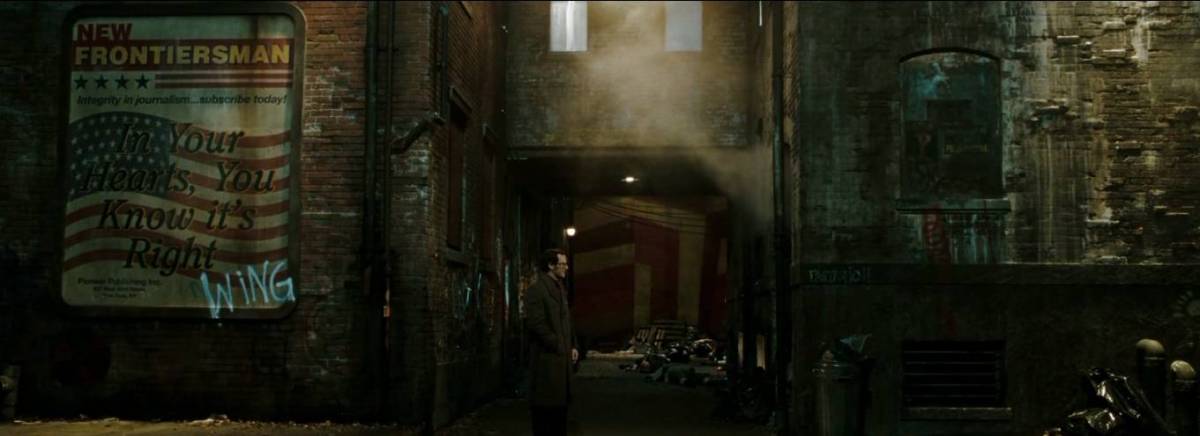
There were campaign slogans about the “silent majority” and then his talk about “law and order.” But even more so, I think that Trump wonders “what if Nixon did all of this stuff, but in public?”
The Nixon tapes caused a scandal when they came to light, and for good reason. You can listen to them (or at least good portions of them), and it’s interesting to think now about how although Nixon said some truly disturbing and racist things on them, Trump has probably said worse right out in the light of day.
It’s as though the very fact that it isn’t hidden makes us think it can’t be some kind of smoking gun. Remember when Trump, during the 2016 campaign, went on TV and directly told Russia he hoped they’d find and release Hillary Clinton’s emails? Or when he told Lester Holt that he fired James Comey because of the Russia investigation? But, I digress…
The point is that Watchmen feels a lot different in 2019 than it did when I first saw the film in 2009.
The opening credits of Zack Snyder’s film remain my favorite part of it. Bob Dylan plays and we see a series of small changes to the course of history. Of course, these involve “superheroes” but it gets one thinking about pivotal moments in a more general way, and how things could have gone differently. My favorite example: what if Henry Wallace had remained Vice President in 1944?
This strikes me as a strength of Watchmen in general: how it asks us to think about how things could have gone another way, and what it would look like if they had. But, of course, the story takes this in a particular direction.
What if there were “superheroes”? We might like to fantasize about them saving us and making the world better, but wouldn’t it be just as likely that they would be co-opted by the forces of fascism?
Whether that’s in their heart, or not, this is what we see Watchmen dramatize. Doctor Manhattan will help “win” the Vietnam War. Nite Owl and Silk Spectre (both versions) are all too willing to go along. The Comedian kills JFK. And Rorschach continues to impose his moral judgments on the world through deadly violence (which is not to say he is always wrong).
The problem with fascists isn’t that they are always wrong—Hitler was a vegetarian who opposed smoking—it’s in the thought they have the right to impose their moral views on the world by force, and in the dehumanization of others. And I would suggest that this remains the case even when those others are criminals. There is a difference between punishing a person for doing something wrong and the move to treat that person as less than a person.
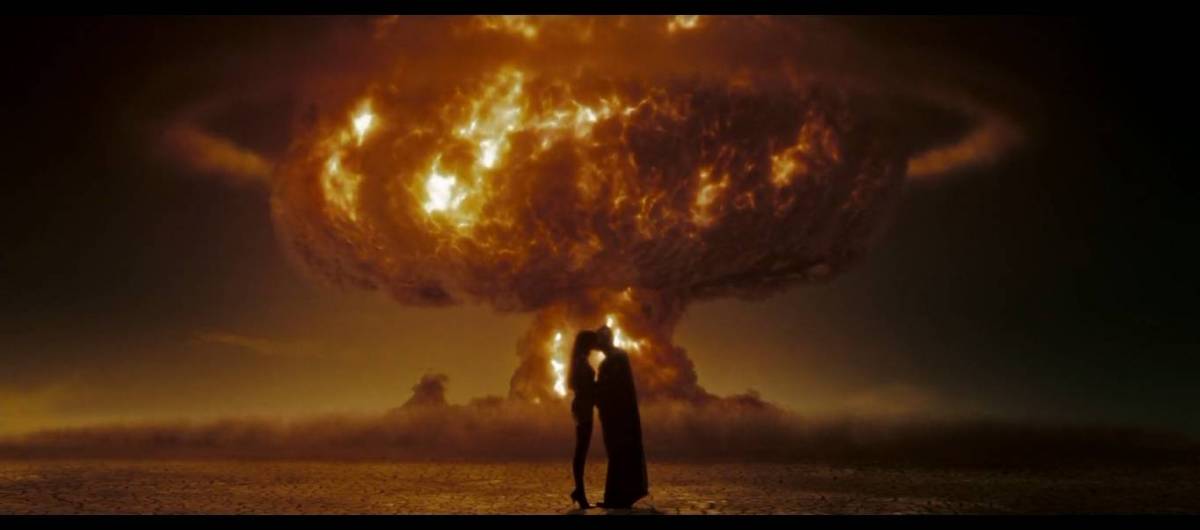
A big question posed by Watchmen is a moral one. On the one hand, we have the view represented by Rorschach. Some things are right, others are wrong, and if you are in the wrong, you deserve to burn.
It’s that last bit that is problematic. It’s one thing to think that justice is a matter of retribution—paying the crime back upon the offender—and another to think that you are in the position to mete out that justice.
A retributivist view of punishment is one thing—perhaps you think the murderer deserves to die, an eye for an eye, and that this is what justice looks like—but vigilantes are another. What keeps them from deserving the same justice they claim to dole out? And who are they to decide? Notions of things like due process become pressing if you think about it.
And if they are backed by the government, this doesn’t help, but rather presents the whole problem of fascism (or authoritarianism) again more generally. Nixon famously contended that whatever a president does can’t be against the law. And that’s the authoritarian move, as it rejects the idea that there are principles that determine matters of right and wrong and instead suggests everything is just a matter of power.
That is, there are two questions here. One is whether right and wrong are hard and fast categories, the other is who has the authority to decide what is right and what is wrong. Immanuel Kant claimed the answer to the latter was Reason as he formulated his Categorical Imperative, but that’s tenuous.
For example, Kant contended that lying is always morally wrong because it could not be willed to be a universal law of human behavior. If everyone always lied, that would mean no one told the truth, and, well, when I lie to you I want you to believe I’m telling the truth, so lying simply wouldn’t work if no one ever did.
But the real world is more complex than that. When confronted with the question of whether it would be OK to lie to save someone’s life, Kant stuck to his guns and said it wouldn’t be. But now we all begin to chafe at his way of thinking. Surely it was right, for example, to lie to the Nazis?
That might motivate us to move away from the notion that there are certain things that are always wrong, but alternately it might move one away from the idea that Reason gives a firm foundation for morality. Rorschach, for example, is hardly a Kantian, but he expresses a moral certitude. And one might feel that he has a point when he refuses to lie, because that lie would be wrong—as a matter of principle.
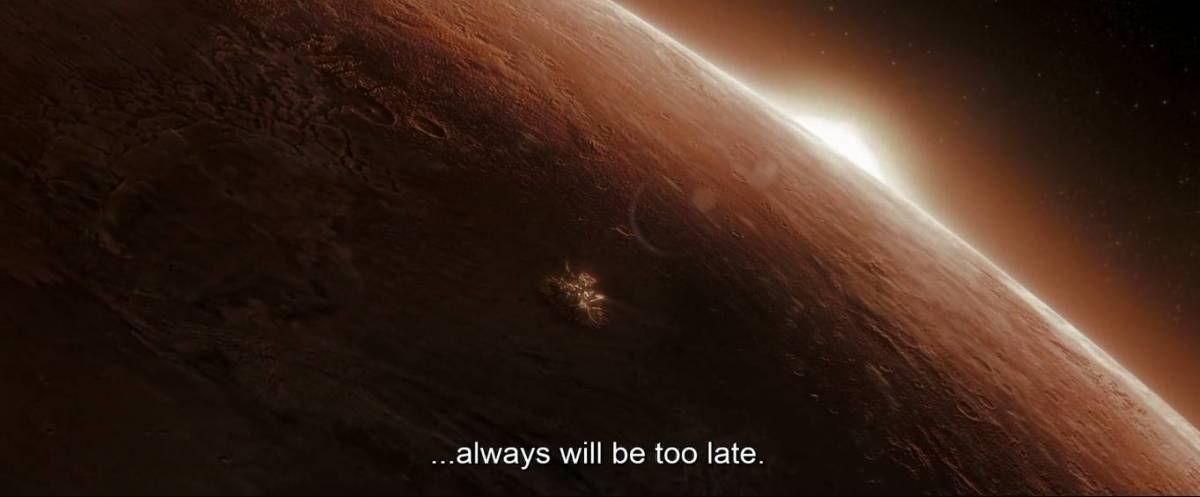
On the other hand, you have the utilitarian logic that morality is about what produces the best consequences. This is compelling when you think about the idea that we should be trying to make the world as good for everyone as possible, but creates its own problems.
What if the bad consequences seem to be lacking? Would it be wrong to spy on someone, for example, even if they never knew about it? Imagine some voyeur who hides a camera in a bathroom, where no one else but him ever knows about it…Or someone in a coma who is raped and never has any awareness of the event occurring…Don’t we want to say these actions remain morally wrong?
But Watchmen takes the same concern in the other direction. It’s a matter of a lie intended to make the world a safer place. Do you go along with this? Rorschach won’t, and thus he must die.
Is it wrong to lie to the world if the result is world peace? That’s one question. But another involves the events that led to that situation in the first place.
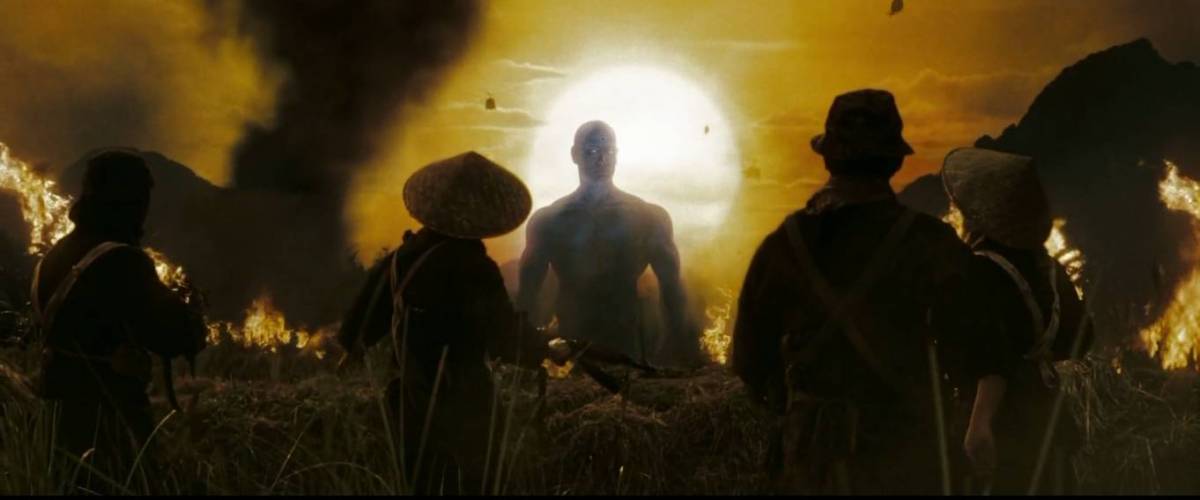
Because, of course, before Doctor Manhattan, Rorschach and the others have to decide whether to agree to cover up what has happened, there is Ozymandias’ scheme. The idea is to threaten the world with something that will make everyone get their shit together, stop the Cold War with its concomitant threat of nuclear annihilation, and so on—a laudable goal, but it comes at the cost of untold millions of lives.
I’m told that in the graphic novel this came in the form of a giant squid, which I will refrain from calling dumb because I have not read the thing. In the film, however, it comes in the form of Doctor Manhattan, and this I like immensely.
It’s presaged by the scene where he kills everyone at the talk show in a fit of rage and takes off to Mars. It’s true that, previously, Manhattan had been squarely on the side of the United States, helping to win the Vietnam War and all, but the film does a good job of showing him becoming ever more detached from humanity. He tells Laurie that she is his only remaining link to the world, she leaves him anyway, and then he kills everyone on that fictional version of Donahue.
This is one of the film’s subtle moments, as it doesn’t dwell on that fact. You might expect people to be outraged. But, instead, they’re worried—worried that Doctor Manhattan is leaving them, and about the threat of an attack by the Soviets.
There is a running thing throughout the film about the Doomsday clock. For what it’s worth, it is currently two minutes to midnight.

Now, we know that Manhattan didn’t do it. He was set up. But this idea of a threat so large that global powers would stand down and take notice resounds. And to make it Manhattan, or, well, some copy of his energy signature, just works for me. Because everyone knows of him, and the threat he presents, and this is like saying that now he is no longer taking sides.
Ozymandias’ plan here is of course suspect, if not evil. He kills millions of people. But I find myself largely on board with the utilitarian logic.
Yes, this was a great wrong, but in service of the greater good. It was to prevent the nuclear holocaust. And I guess maybe it depends on how seriously we take that threat, as Watchmen makes it clear that it is real.
The Nixon in this world (who is still president in the ’80s) is fully ready to engage in a nuclear strike. Snyder shows us this, presenting a hope that maybe we’d only lose the Eastern seaboard—precisely what gets lost as a result of Ozymandias’ plan.
The fact that this was keyed off by the Soviets making moves to invade Afghanistan—something which, in the real world, did not go well—adds a note of irony to the whole thing. Or, rather, it gets to how fortunate we actually were to avoid nuclear conflict during the Cold War. It was always more or less a breath away, and maybe with the wrong person at the helm (Nixon), it would have happened.
We might hope for something better, and the real world has perhaps been better, somehow—at least we’ve avoided nuclear Armageddon—but in the world of Watchmen we’re pretty much told that this is going to happen. Nixon has already started to prepare the nuclear strike.
Which makes Ozymandias the hero.
He’s right about his plan being better than other available options. Did he have enough information to know this? I’m not sure, but he may well have, given his connections. Is it justifiable to kill millions to save the world? That one’s tougher, but I do tend to want to say the answer is yes, if that’s what it’s really down to. (But I’ll recognize again the problem of knowing that for sure.)
What’s clearer, in my mind, is that he’s right that the others should keep the lie in light of what he has done. Even if this was a very bad thing to do, think about the consequences of exposing it. It seems like they would likely involve a nuclear holocaust.
Rorschach is wrong—as much as it might buck against our moral intuitions. The utilitarian calculus is right, as much as its problematic and fraught to figure out in the real world, and as much as we might want to condemn Ozymandias for what he did in the first place.
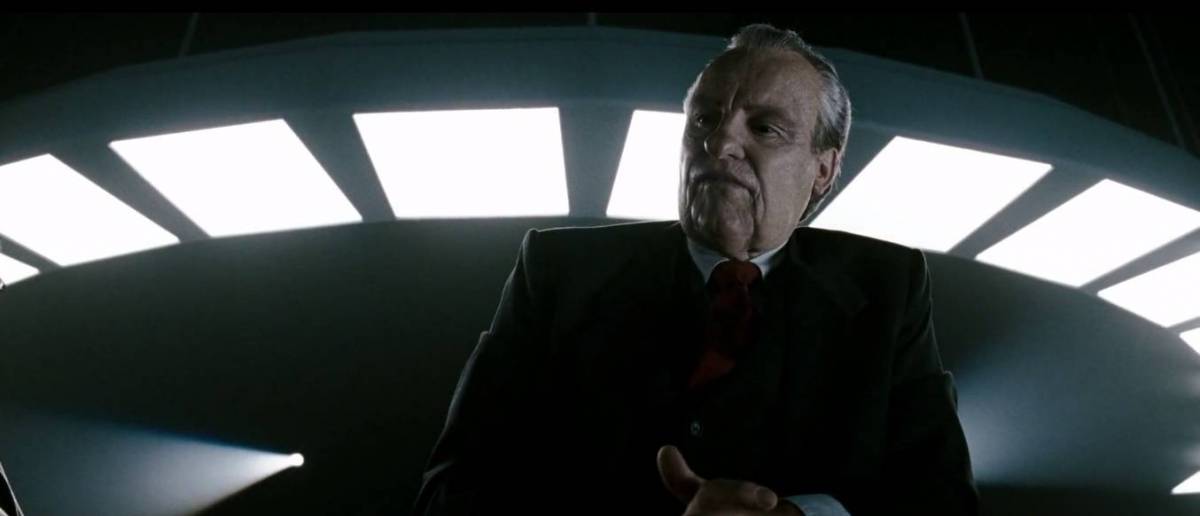
It’s interesting to watch Watchmen again in 2019, as opposed to when I originally saw it in the theater in 2009.
Then, Barack Obama had just become our president, and as much as I ultimately became disappointed in him, there was a moment of hope. George W. Bush had just left office, and maybe this movie was made while he was still in there. But, as terrible as that presidency was, and as much as I thought it would be the worst in my lifetime, Watchmen doesn’t really resonate with that. It seemed more like an alternate timeline where things had gone very wrong, and though there were insights to be drawn from it, they didn’t feel all that pressing.
But now we have the Trump administration, and this feels far more in line with the world that Watchmen presents. It’s not that we still have Nixon, but it does kind of feel like Nixon all over again—but worse.
No “superheroes” led to this, and no changes in history. Instead, it would seem it is just a matter of some historical pendulum swinging back around. History repeats, but with a difference.
What then will it look like to get HBO’s Watchmen in 2019? What motivated this iteration of the idea? The first teaser HBO put out featured a number of people in masks resembling Rorschach’s.
Is this some kind of cult of the truth? There is a moment in the second trailer that makes me think it might be, where one of them yells something about precisely that. But what is the truth in question? Is it the lie that ended the Watchmen, whether pinned on Doctor Manhattan, or, I guess, a giant squid?
And, if so, what’s the commentary here? I’m told that there is something in the comics with Rorschach moving to reveal the truth, and that comparisons to the alt-right might not be off-base, and I could see that, but the analogy seems somewhat off…Is this series going to play with the idea of “conspiracy theorists” who are actually right? I’m not sure how I might take that.
I won’t speculate further, but just say that I am excited for HBO’s Watchmen series and very curious about where it will go. Damon Lindelof’s previous involvement in Lost and The Leftovers has me hopeful, at very least, and the Watchmen universe is intriguing.
Watchmen begins on HBO on October 20th



Doctor Manhattan didn’t kill everyone at the talk show before leaving for Mars. He teleported them all away.